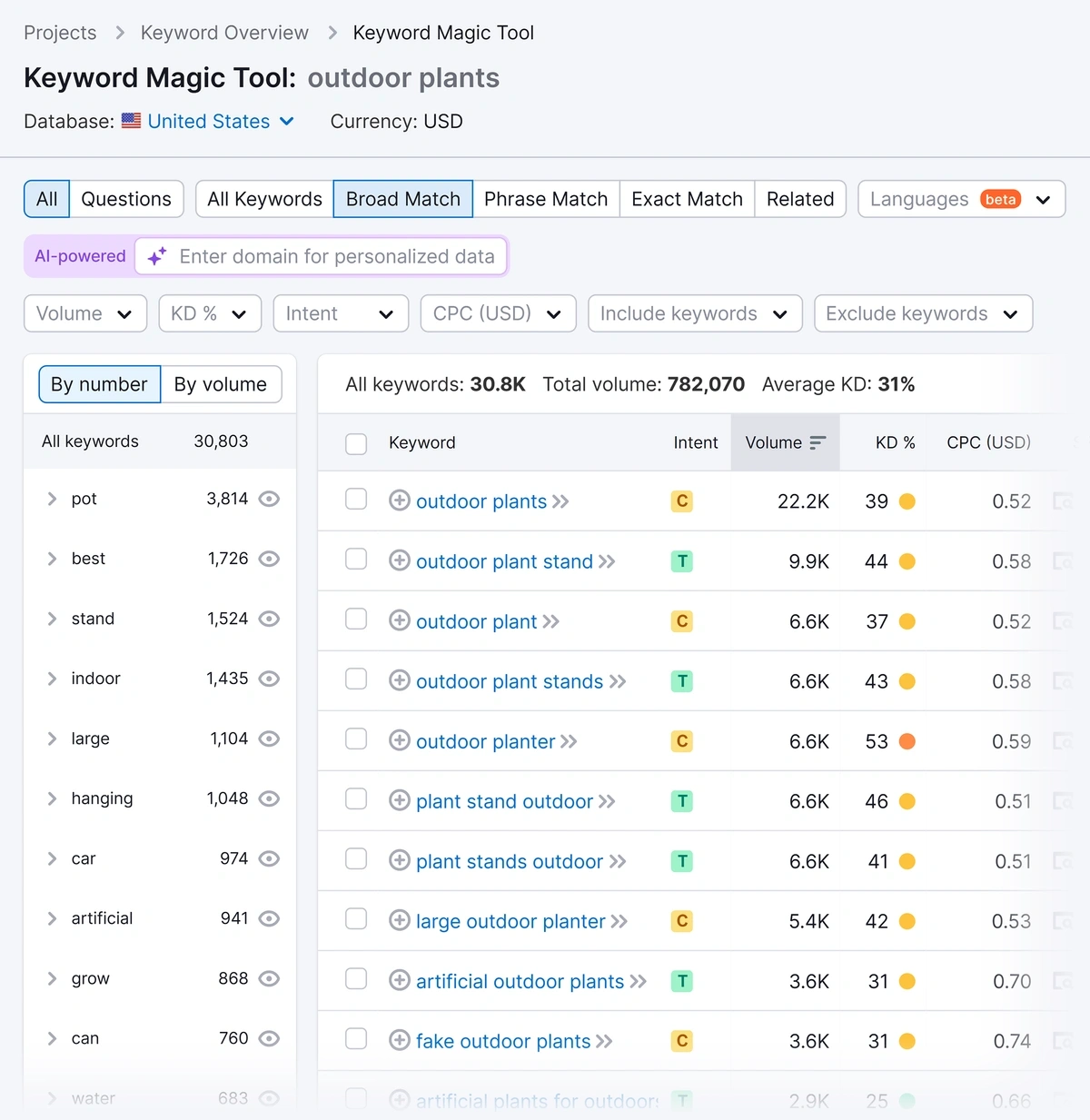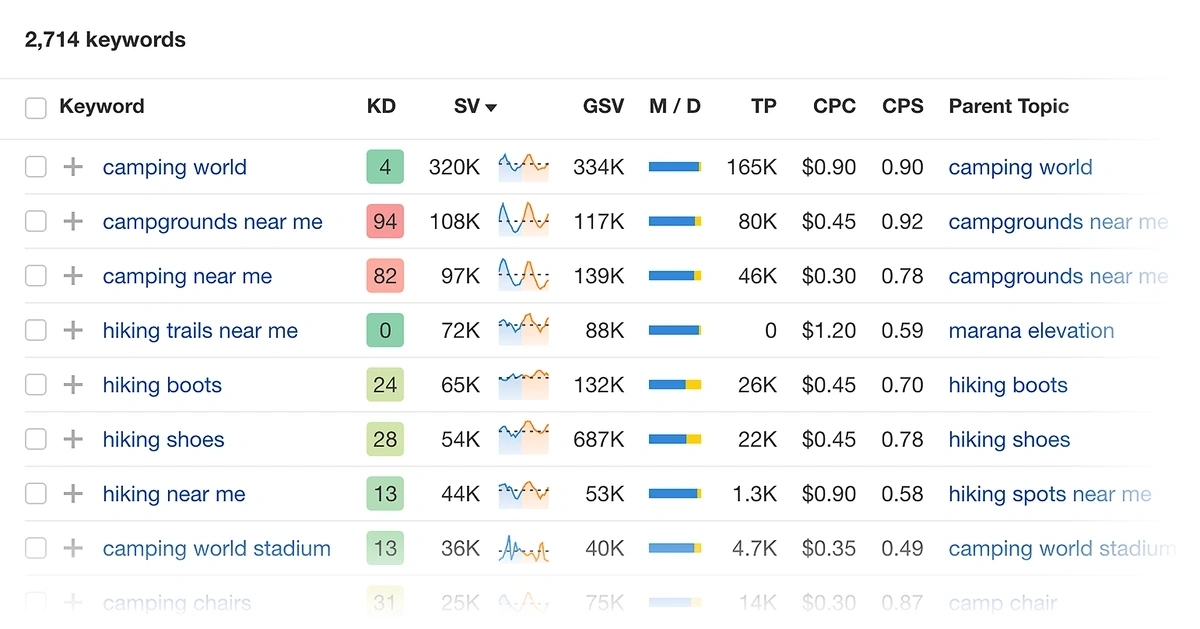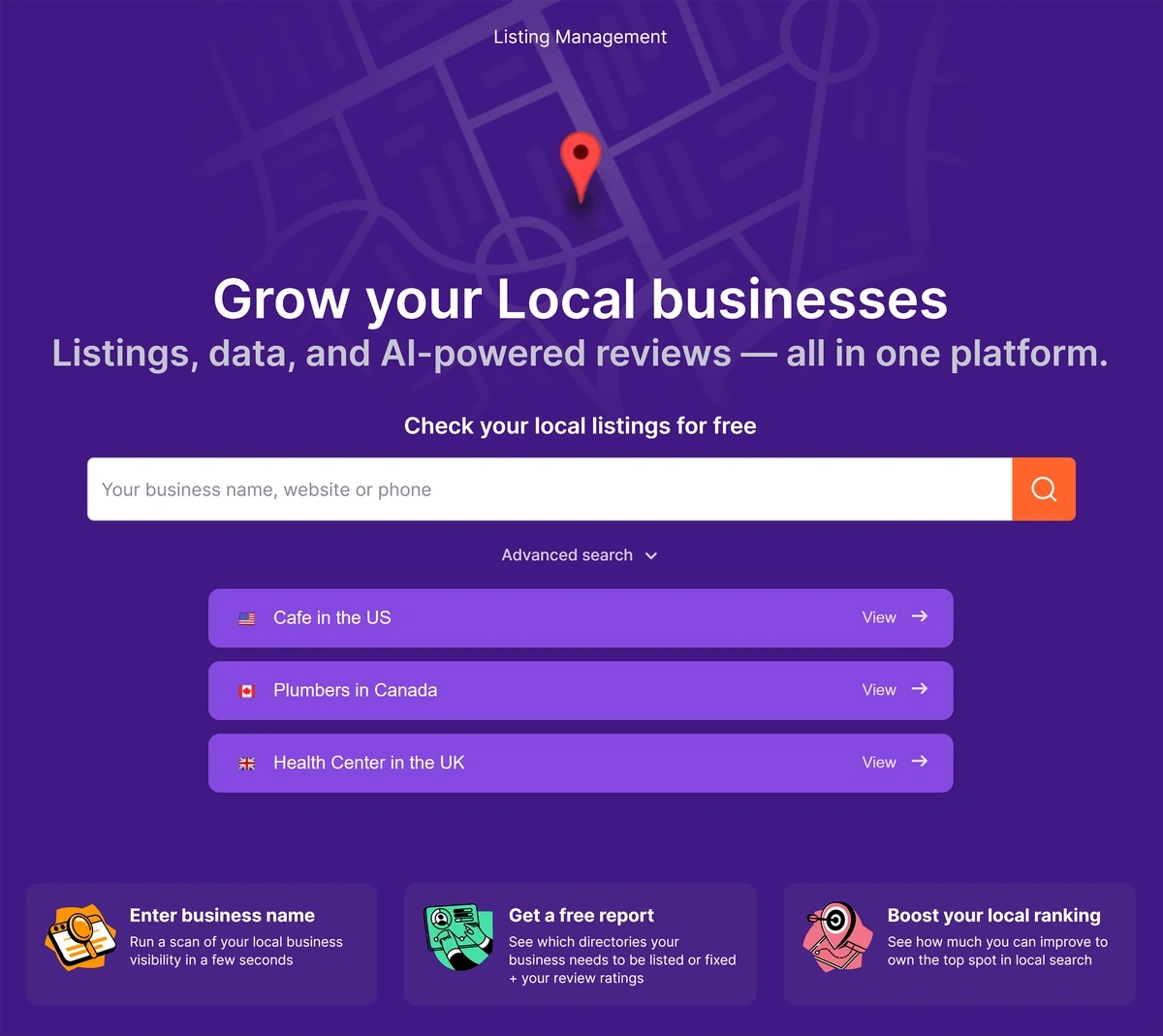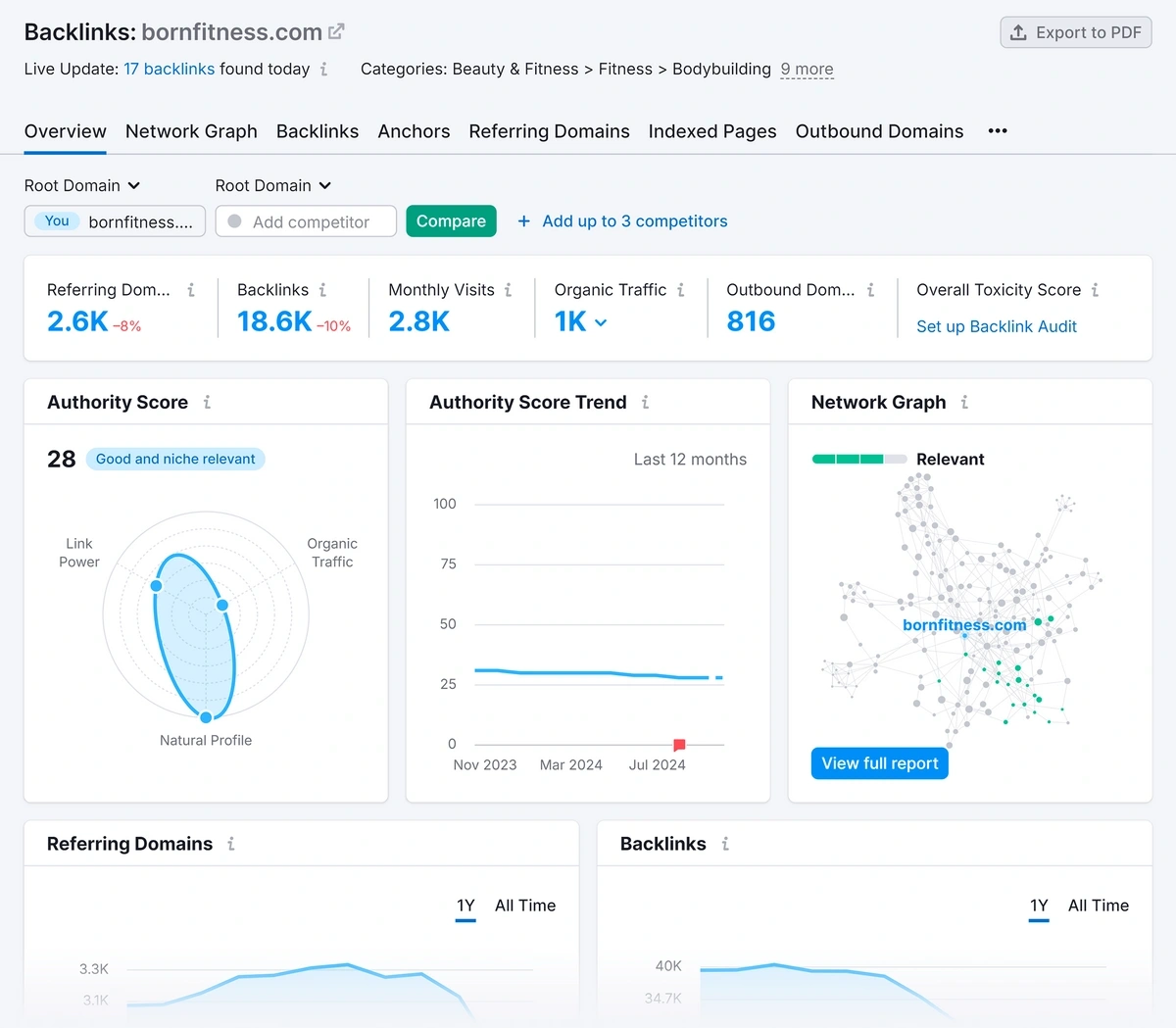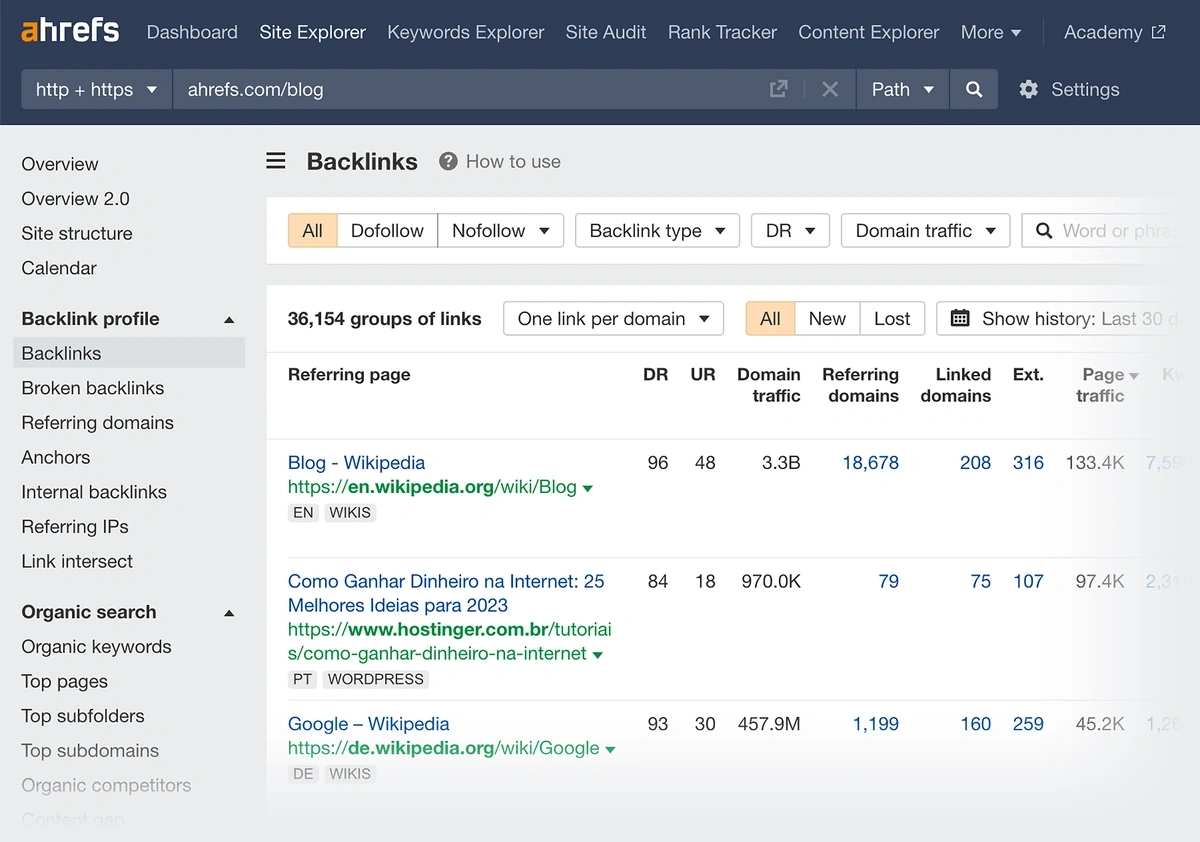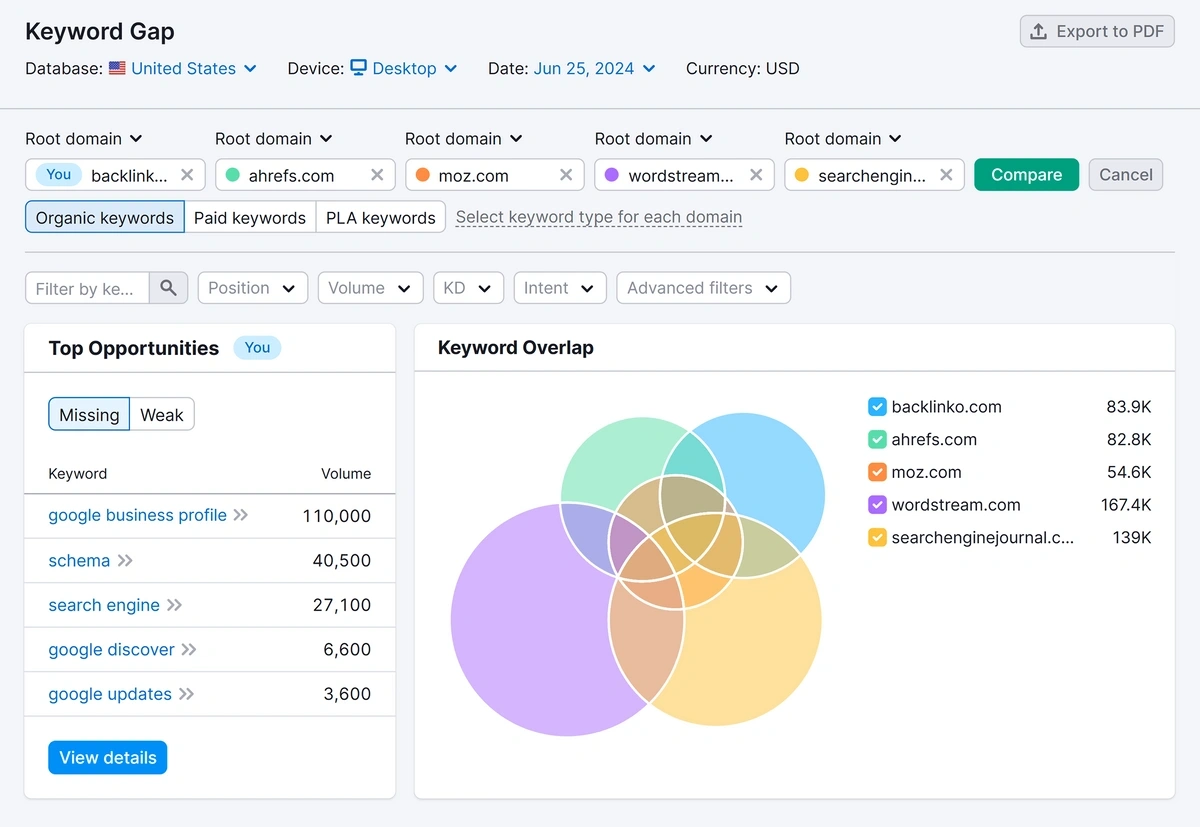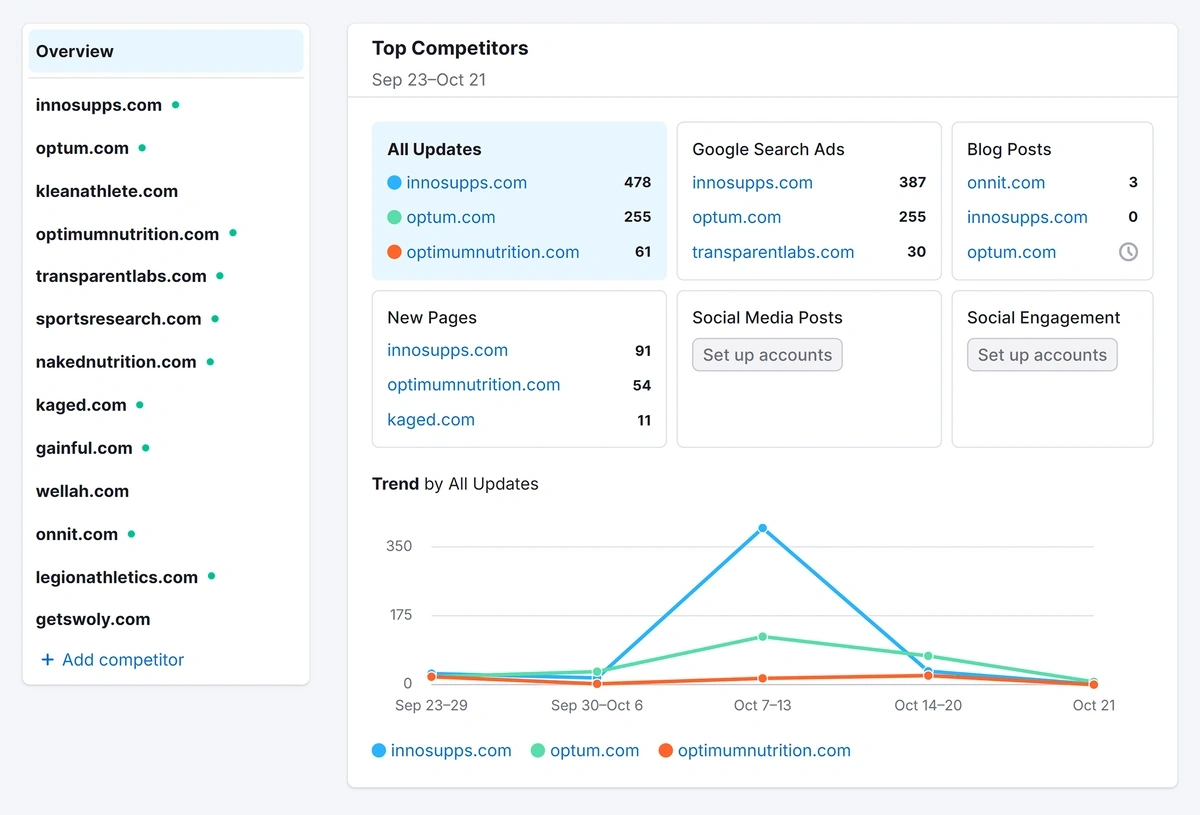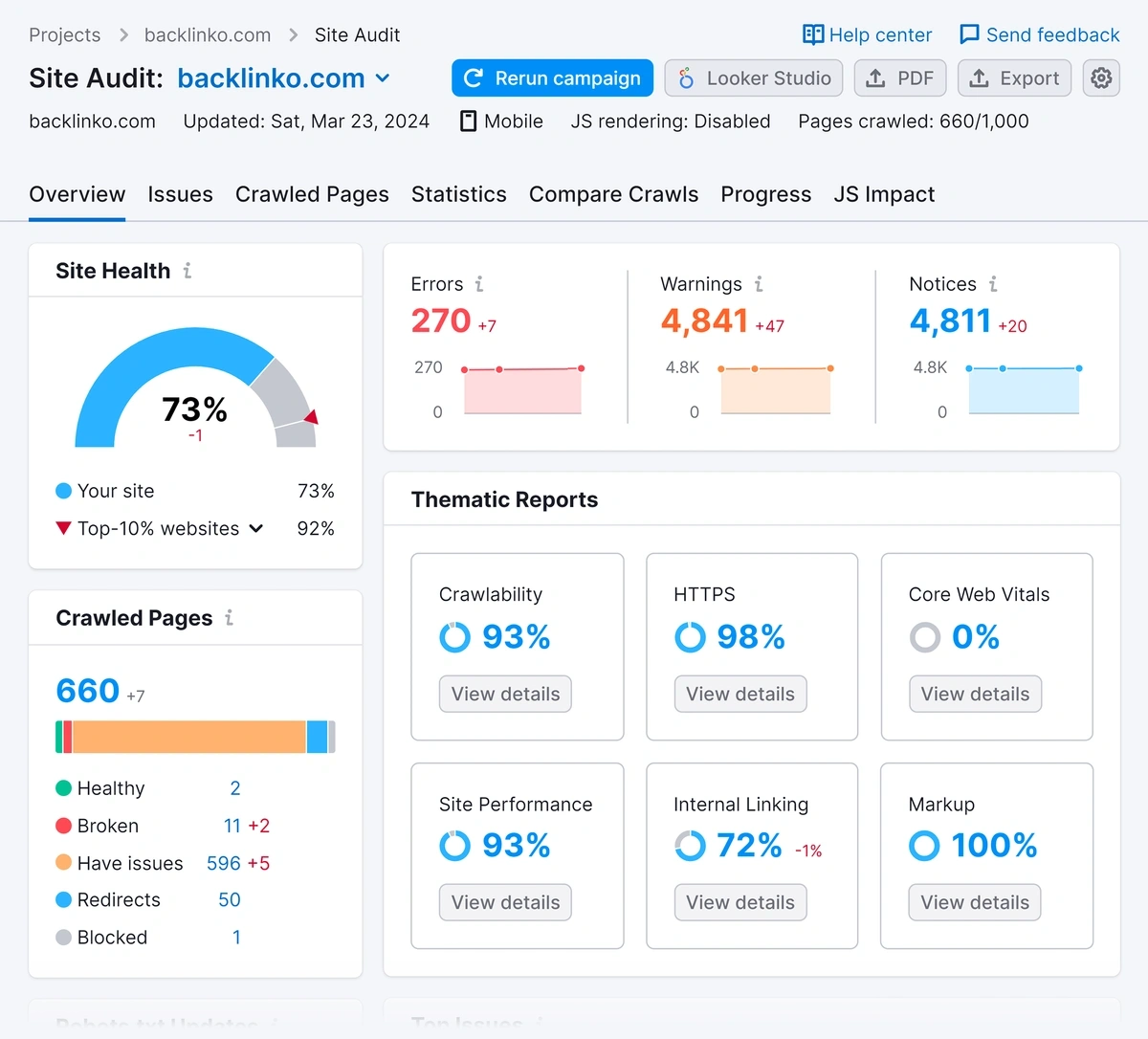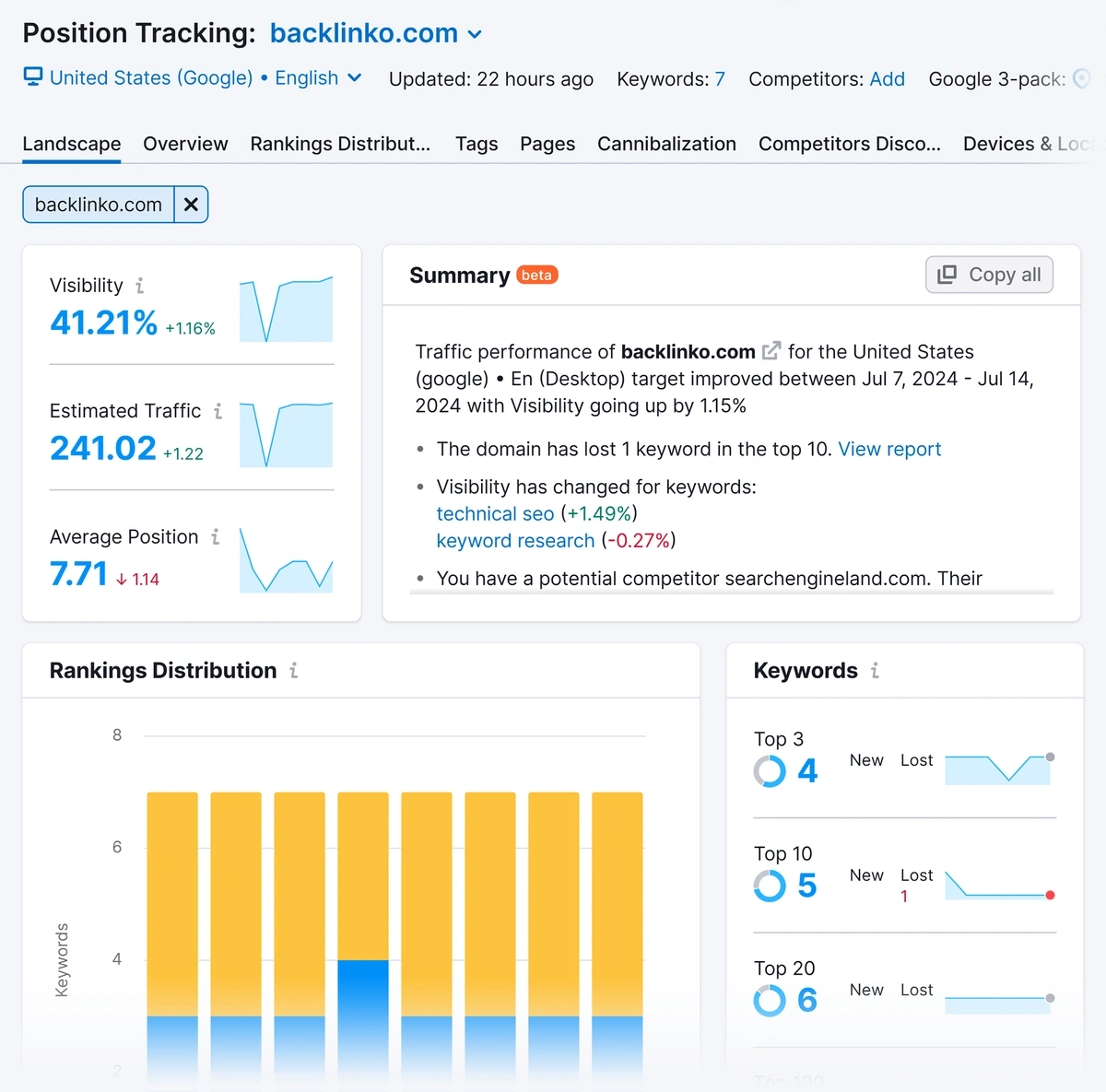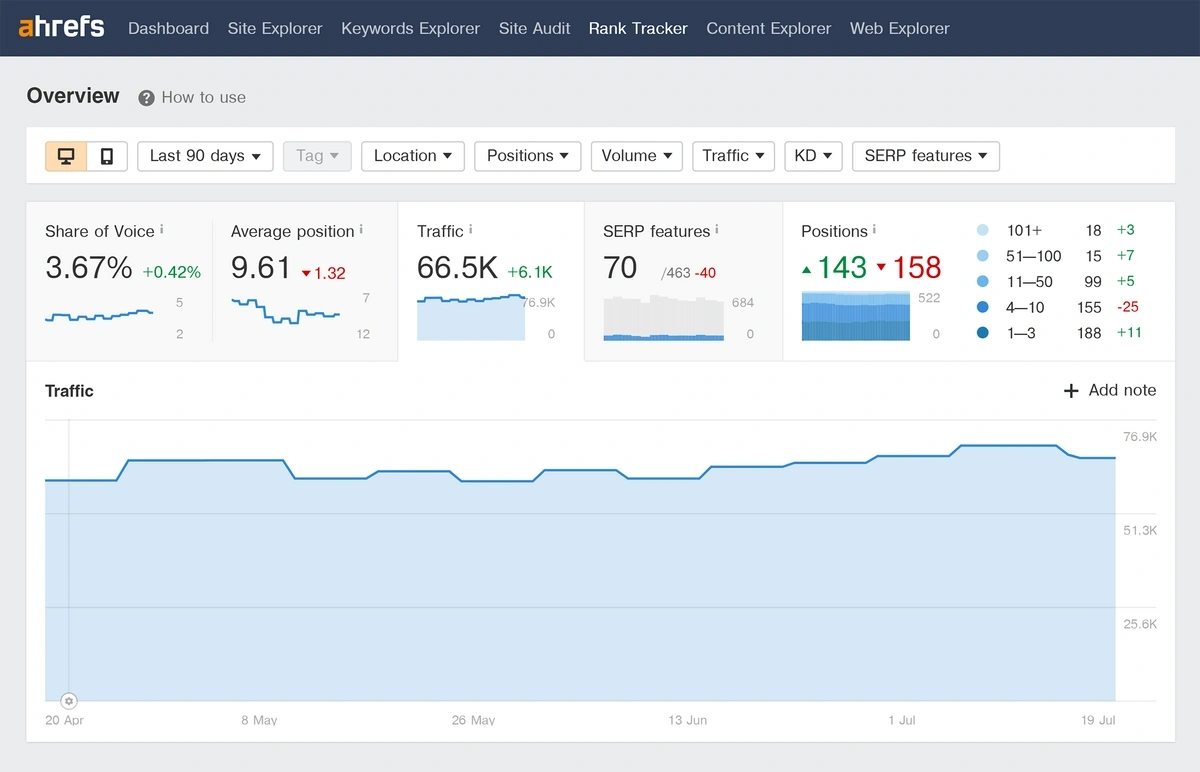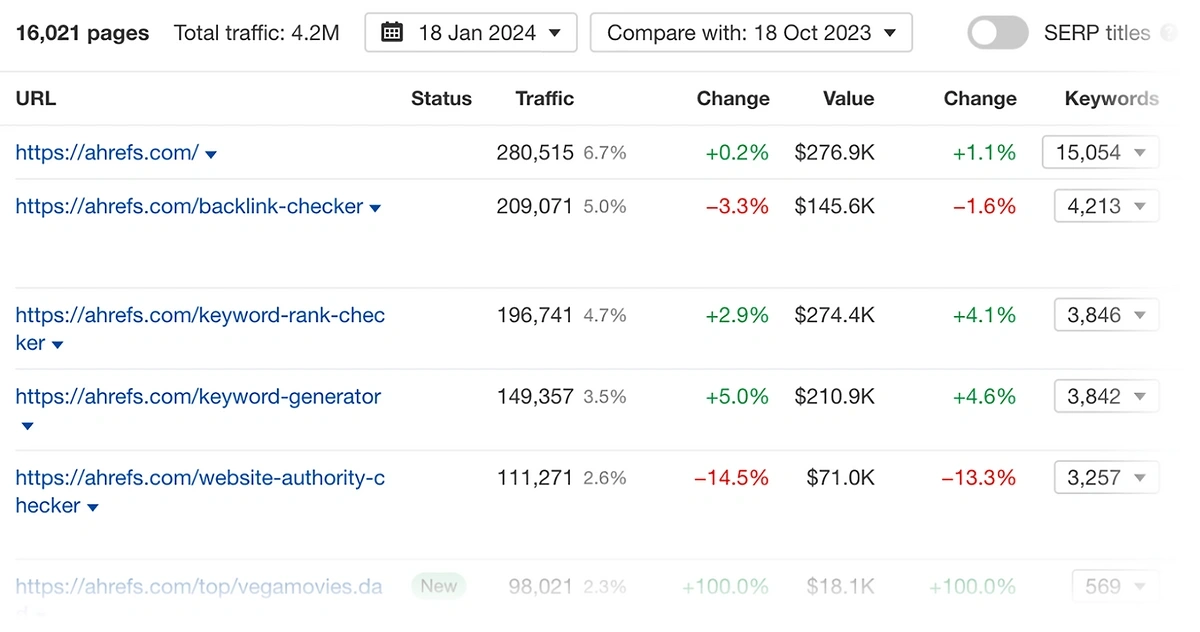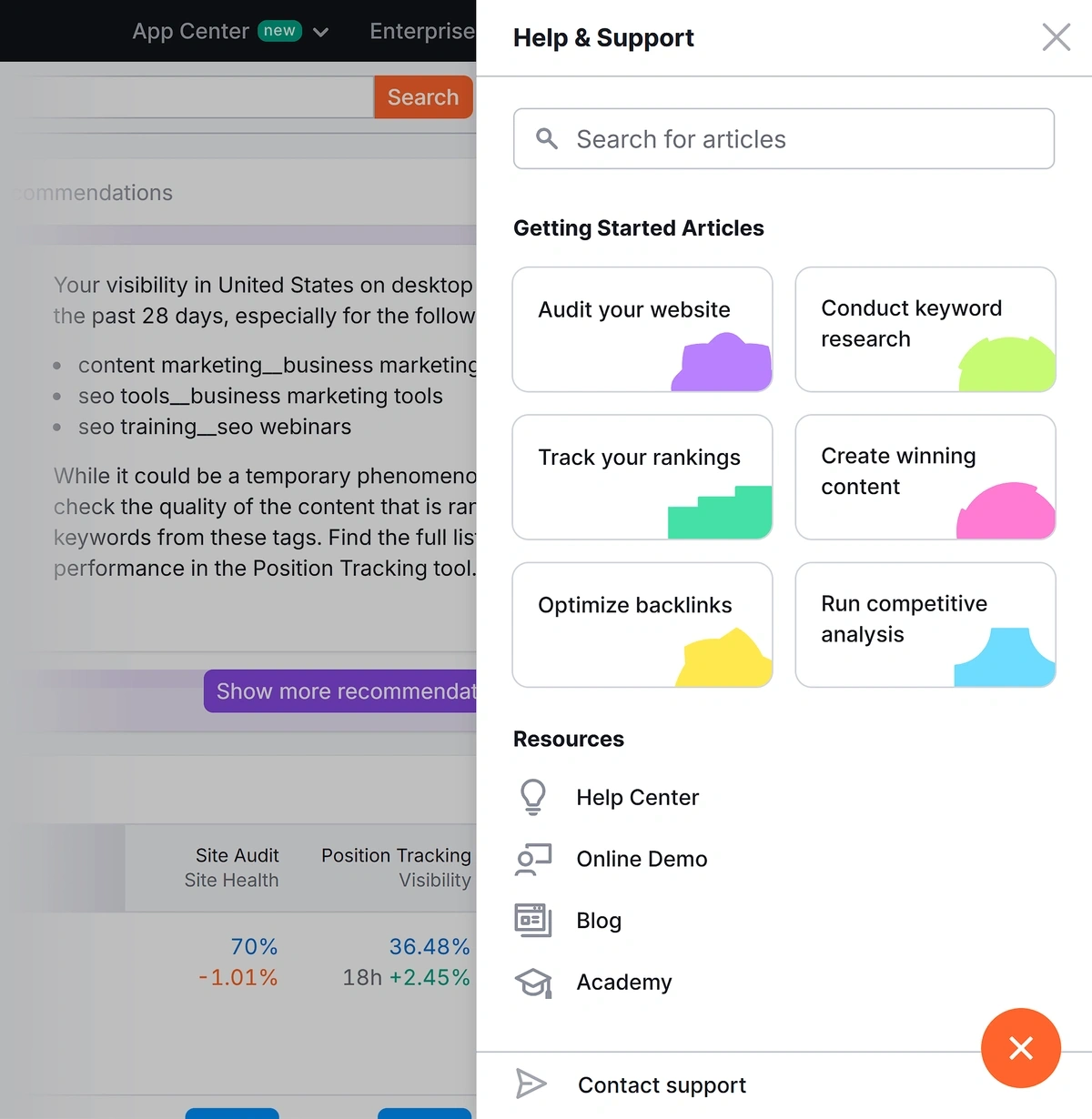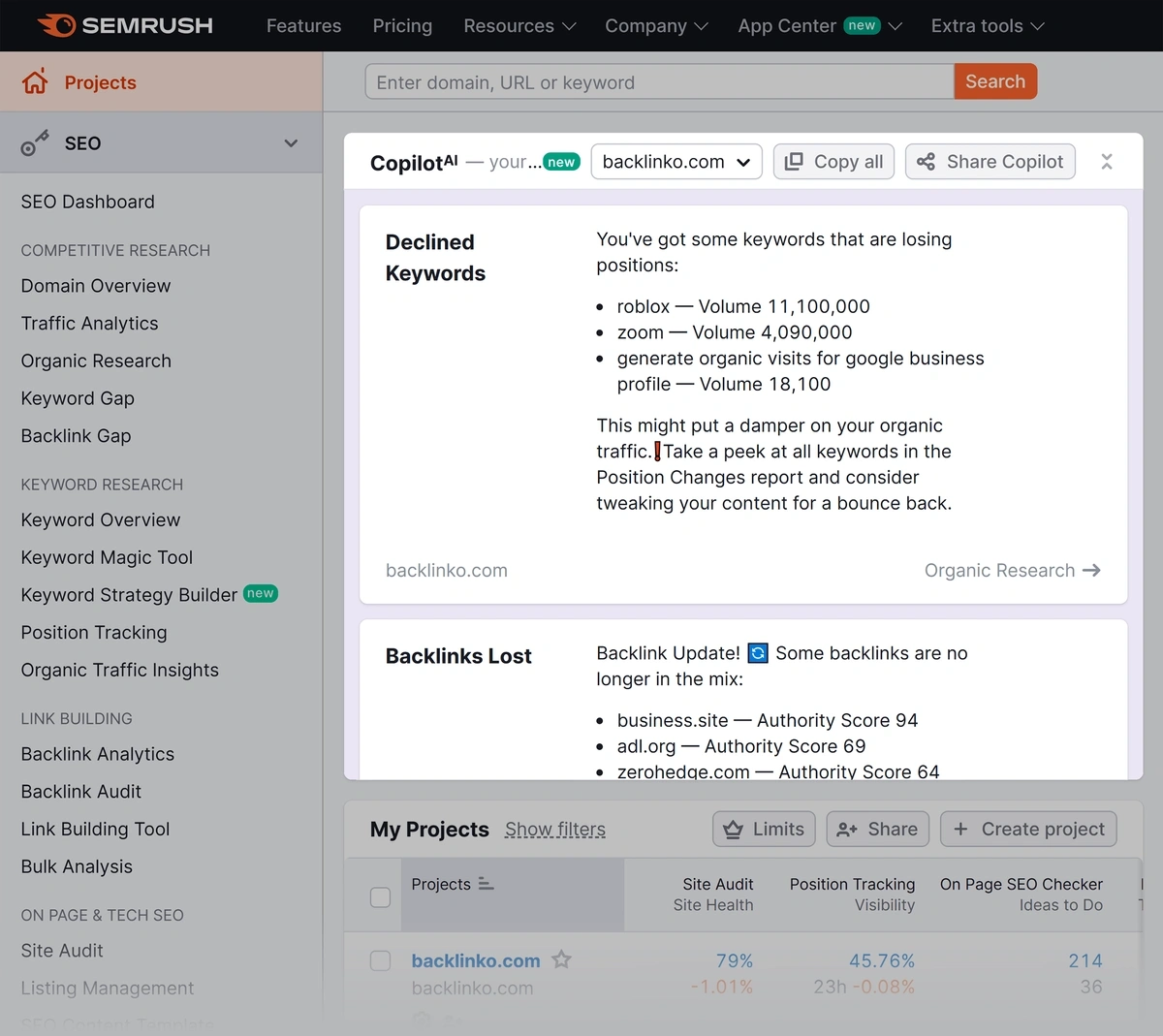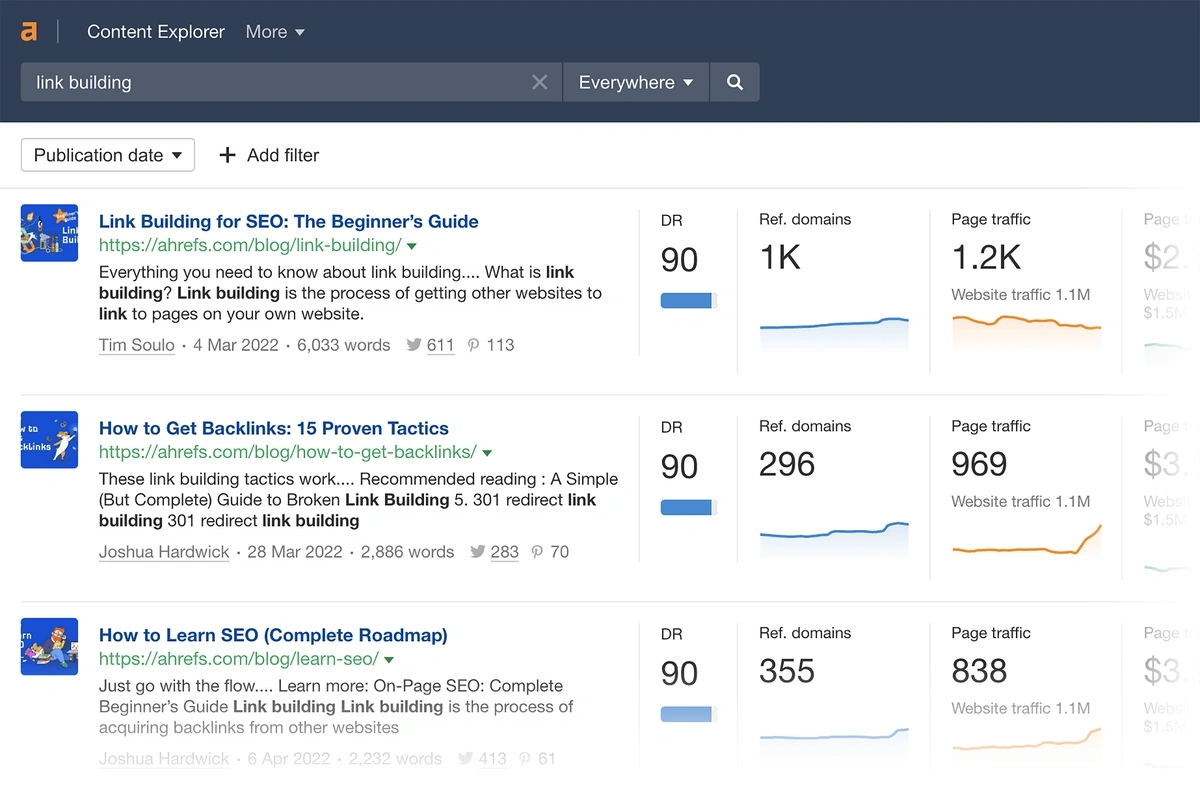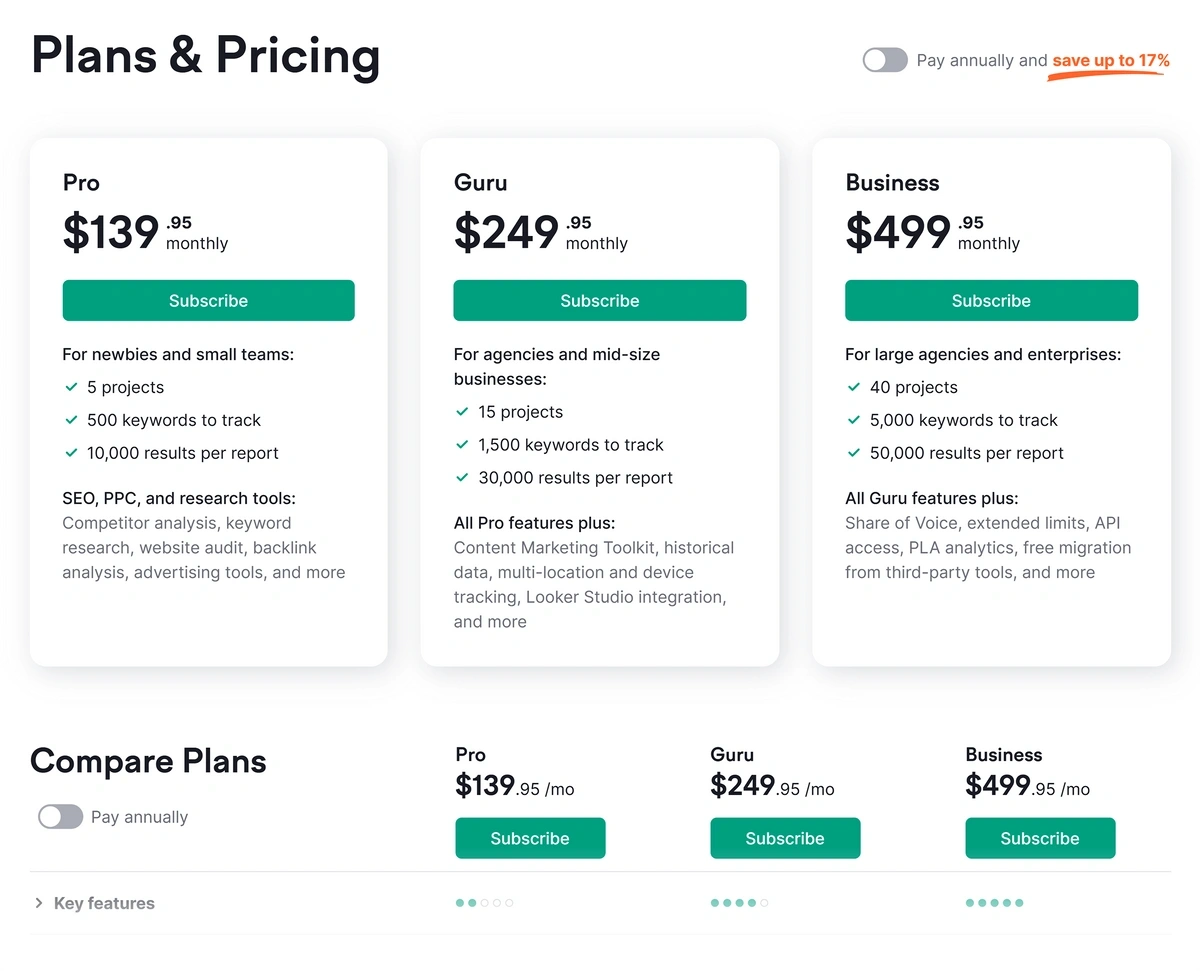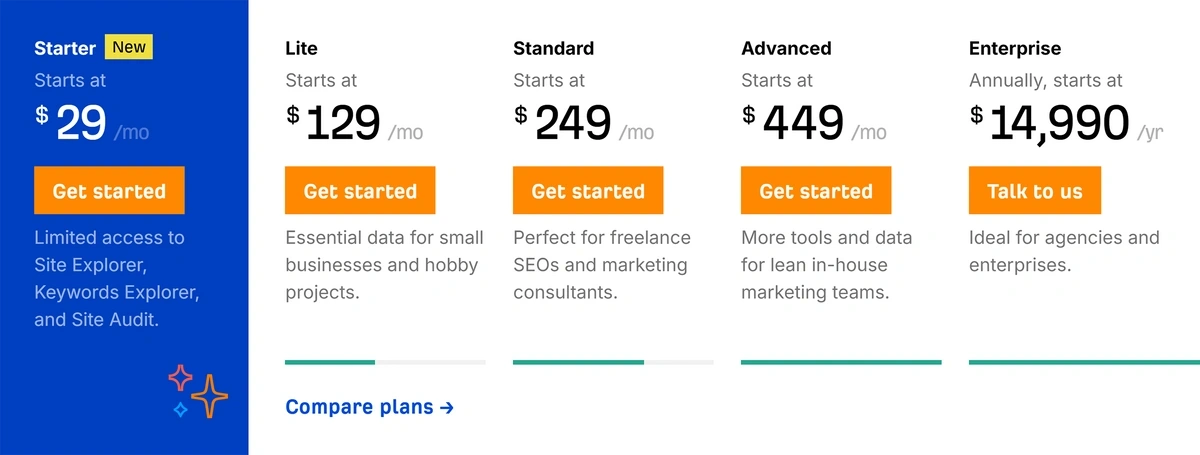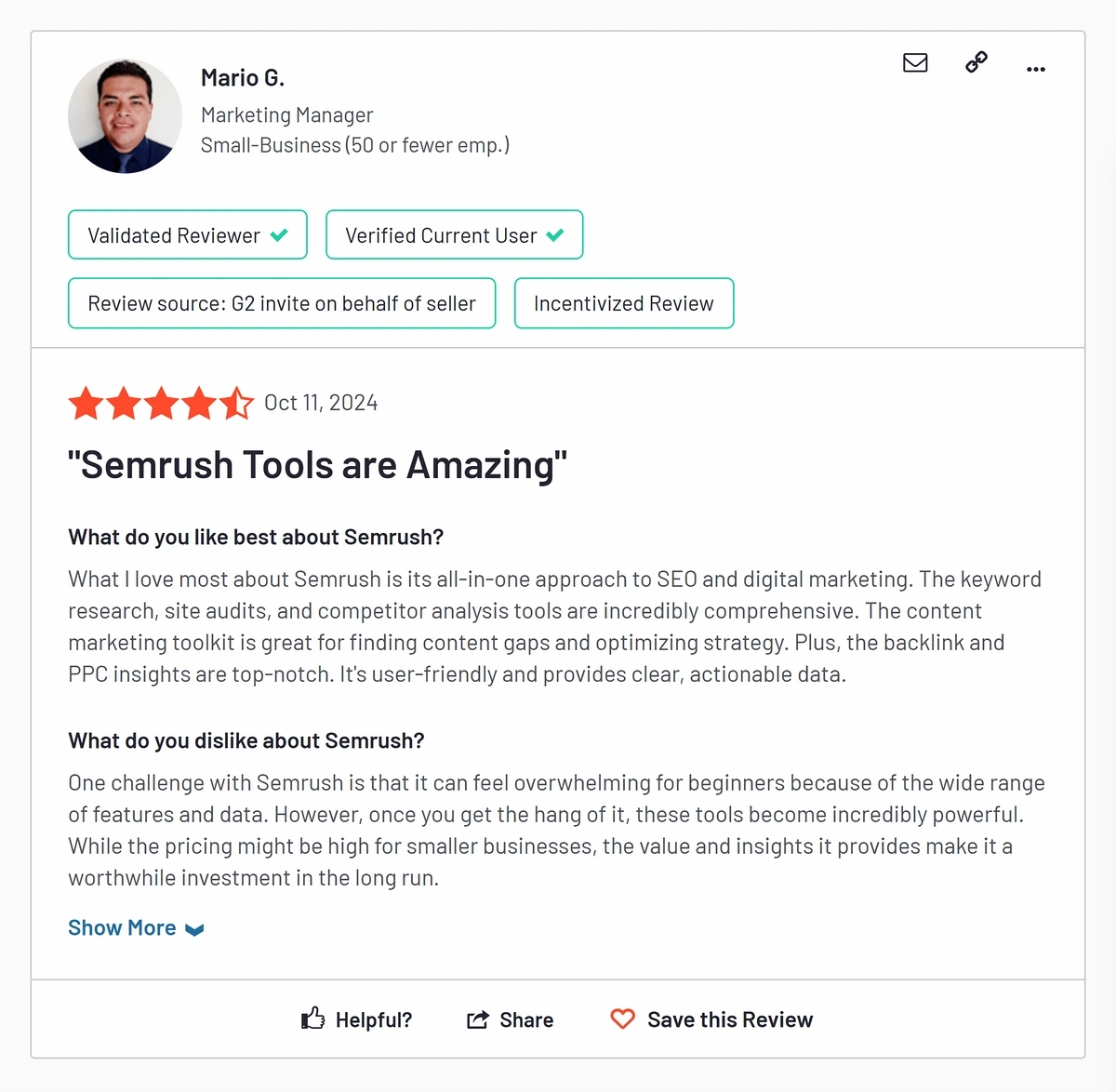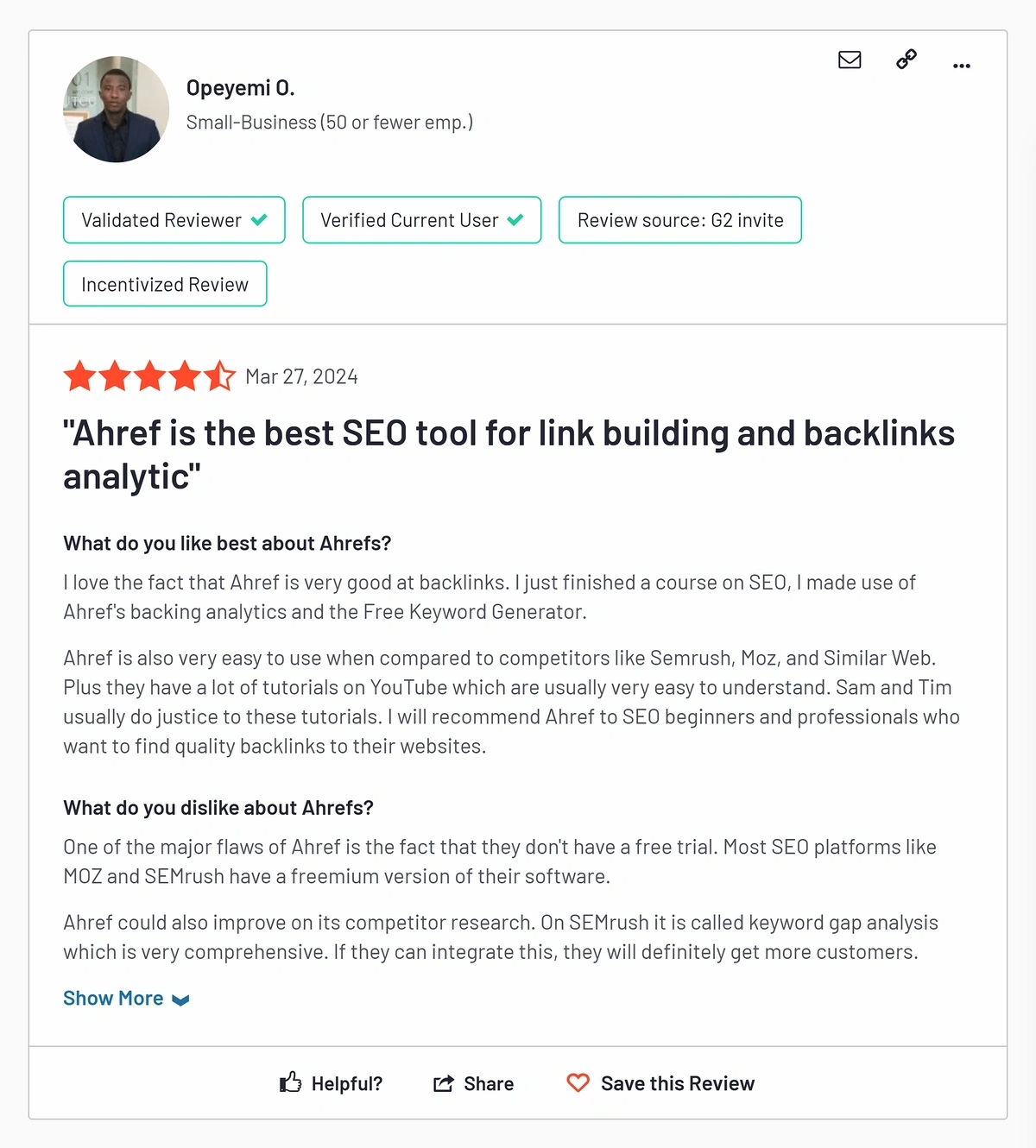Get Advanced Insights on Any Topic
Discover Trends 12+ Months Before Everyone Else
How We Find Trends Before They Take Off
Exploding Topics’ advanced algorithm monitors millions of unstructured data points to spot trends early on.

Features
Keyword Research
Performance Tracking
Competitor Intelligence
Fix Your Site’s SEO Issues in 30 Seconds
Find technical issues blocking search visibility. Get prioritized, actionable fixes in seconds.
Powered by data from
Ahrefs vs Semrush: My Honest Comparison [2025]
The main difference between Ahrefs and Semrush is their core focus. Ahrefs excels in backlink analysis and keyword research with a simple interface, while Semrush offers a broader toolset for SEO, PPC, and content marketing. Semrush provides more features, but Ahrefs is often preferred for link-building insights.
As an avid user of both tools, I rely on each one for specific needs.
But depending on your use case, you'll find one of these tools better than the other.
Let's compare these powerhouse platforms to help you decide where each belongs in your marketing toolkit.
| Feature | Semrush | Ahrefs |
| Keyword Research | Offers the Keyword Magic Tool with extensive filters, AI-powered Personal Keyword Difficulty (PKD) scores, and integration of both SEO and PPC data. Ideal for comprehensive keyword analysis across organic and paid strategies. | Provides the Keywords Explorer with metrics like keyword difficulty, search volume, and traffic potential. Features like "also rank for" and position history tracking are valuable for content creators focusing on organic growth. |
| Backlink Analysis | Includes tools to track existing backlinks, assess link toxicity, and identify new link-building opportunities. Offers insights into pages with the most links and categories of linking sites. Unique features like competitor backlink gap analysis aid in crafting data-driven strategies. | Tool of choice for many SEOs when it comes backlink analysis. Features include identifying top-performing pages based on links, analyzing anchor texts, detecting broken links, and assessing link types. The "best links" feature allows users to pinpoint the most valuable backlinks efficiently. |
| Competitive Analysis | In-depth Traffic Analytics and Keyword Gap Analysis, providing visual reports on competitors' traffic sources, keyword performance, and backlink opportunities. The EyeOn tool (costs extra) aids in monitoring competitor content and social media activities. | Utilizes Site Explorer and Content Gap Analysis tools to offer deep insights into competitors' organic search performance. While not as visual as Semrush, it effectively highlights pages driving the most traffic and backlinks for competitors. Less emphasis on PPC data compared to Semrush. |
| Site Audits | Conducts comprehensive site audits, identifying issues like broken links, server errors, and Core Web Vitals. Unique features include Log File Analysis and the ability to perform detailed content audits, aiding in thorough technical SEO evaluations. | Offers solid site audit functionalities focusing on detecting common issues such as duplicate content and slow-loading pages. While effective for basic technical SEO checks, it lacks advanced features like log file analysis present in Semrush. |
| Rank Tracking | Features the Position Tracking tool, allowing users to monitor keyword rankings over time across different devices and locations. Updates and supports tracking for desktop, mobile, as well as other search engines (Bing, Baidu, ChatGPT) | Includes a Rank Tracker that enables monitoring of keyword positions over time. While effective, it offers fewer customization options compared to Semrush's Position Tracking tool and only tracks Google. |
| Usability & Interface | Comprehensive suite with a slight learning curve due to its extensive features. Once familiar, users can leverage a wide range of tools for various digital marketing needs. | Known for its clean and straightforward interface, focusing primarily on SEO. Tools like Site Explorer and Rank Tracker are easily accessible from the main dashboard, making it user-friendly for SEO professionals. |
| Unique Features | Serves as an all-in-one digital marketing platform, encompassing SEO, PPC, content marketing, social media management, and trend analysis. Tools like the Content Marketing Toolkit and Social Media Tracker provide added value for comprehensive marketing strategies. | Specializes in SEO-focused tools, offering features like Content Explorer for discovering top-performing content and broken link building tools. While it doesn't encompass broader digital marketing tools, it excels in providing in-depth SEO insights. |
| Pricing & Free Trials | Offers a 7-day free trial and a permanent free account with limited daily usage. Paid plans start at $117.33/month when billed annually, with higher-tier plans providing additional features like content marketing tools and historical data. | No longer provides a free trial. Paid plans start at $29/month, but the credit system on lower-tier plans can be restrictive, limiting the number of reports and data access. This structure may feel limiting for users requiring extensive data analysis. |
| Customer Reviews | Highly rated by full-stack marketers and agencies for its comprehensive features, especially in managing paid campaigns and analyzing traffic. Holds an average rating of 4.6/5 on G2. Some users note a learning curve due to its extensive toolset. | Favored by SEO specialists and freelancers for its simplicity and depth in SEO-specific tasks. Holds an average rating of 4.5/5 on G2. Some users express frustration with the pricing structure, particularly the credit system on lower-tier plans. |
Which Is the Best Tool, Ahrefs Or Semrush?
Those are my general thoughts about Semrush and Ahrefs.
But a closer comparison of individual features between the two SEO tools reveals different strengths and weaknesses that can help you decide which tool suits your particular use case.
To help you compare, I broke down Semrush vs Ahrefs based on:
- Keyword Research
- Backlink Analysis
- Competitive Analysis and Trends
- Site Audits
- Rank Tracking
- Usability & User Interface
- Support
- Unique Features
- Pricing
- Customer Reviews
Let's take a deeper look.
Semrush vs Ahrefs For Keyword Research
Both Semrush and Ahrefs have robust keyword research features.
If you've tried the Exploding topics free keyword research tool, you'll have a basic idea of the terms you could target.
But the Semrush Keyword Magic Tool goes beyond SEO to include paid search (PPC) data. It also gives you more ways to analyze keywords.
You can easily:
- Cluster keywords
- Understand search intent
- Get insights that span organic and paid strategies.
You can break your keywords down by keyword difficulty, search volume for different regions, and even cost-per-click (CPC).
I like this filter feature when I’m researching keyword opportunities for my sites. Limiting keywords to lower difficulty, but high CPC has allowed me to target valuable, easy wins.
See more examples in our guide to using Semrush for keyword research.
If you’re working with a specific domain, you can use the AI-powered personal keyword difficulty scores (PKDs) to get more precise information.
Ahrefs Keywords Explorer provides metrics like keyword difficulty, search volume, and traffic potential.
This tool also helps you identify:
- Additional keywords related to your seed keyword
- Questions related to your keyword
- An “also rank for” feature, which can easily help you identify secondary keywords.
The position history tracker allows you to see how pages have moved up and down in the rankings.
I use this feature to help identify how volatile a keyword might be or see if the same sites have held steady positions. This helps me with my strategy for approaching these topics.
If you run a brick-and-mortar store, Semrush offers tools to boost your local visibility, which could be a valuable advantage over Ahrefs.
(Remember, Semrush Local SEO features will cost you an extra $50/month).
The Verdict: If you’re working on both organic and paid search, Semrush might be your better bet.
If you’re focused on organic growth Ahrefs is a good choice.
Build a winning strategy
Get a complete view of your competitors to anticipate trends and lead your market
Best SEO Tool For Backlink Analysis
Both Semrush and Ahrefs offer backlink analysis tools. They each have different features to consider.
Semrush allows you to:
- Track your existing backlinks
- Examine potential link toxicity
- Identify new opportunities for your link-building strategy.
You can also see:
- Pages on your domain with the most links
- Categories of sites linking to your site
- Sites that would be good to earn links from based on your competitors.
This is unique to Semrush.
When I worked on link-building strategies for clients, Semrush’s competitive analysis quickly helped me identify what sites I should be doing outreach for.
I can understand what type of content these publishers might be looking for. This takes a lot of guesswork in identifying the right publishers.
Ahrefs is known for its backlink checking tools. Some of the Ahrefs backlink features are easier to navigate when compared to Semrush.
Ahrefs allows you to easily find your top-performing pages based on links, similar to Semrush.
It has a “best links” feature that quickly allows you to identify the best links pointing to those pages.
You’re also able to quickly identify:
- Anchor text for your links
- Types of links pointing to your domain
- Broken links
Many people ask: is Ahrefs accurate when tracking backlinks?
In my experience, yes. I’ve seen more of my links show up in Ahrefs than in Semrush. That has helped my reporting efforts.
I like the simplicity of the analysis in Ahrefs for getting the most important information quickly. However, I’ve relied on Semrush to craft a data-driven strategy for my teams and clients.
I suggest checking out this detailed Semrush review from my colleague to learn more about their experience with Semrush.
The Verdict: If backlink building is a core part of your strategy, Ahrefs wins this round. It has a huge database and historical tracking.
If you need something to help clean up toxic links and spot competitive opportunities, Semrush’s backlink gap analysis could give you the edge.
Ahrefs vs Semrush: Competitive Research and Trends
No SEO strategy is complete without a competitive analysis. Ahrefs and Semrush both have tools to help with this.
Semrush shines here with its Traffic Analytics and Keyword Gap Analysis features.
It provides easy-to-understand reports on:
- Where your competitors’ traffic is coming from
- Whether it’s organic or paid
- How their keyword performance stacks up against yours.
Plus, the backlink gap analysis feature we mentioned earlier is handy for finding link-building opportunities you have missed.
I’m a very visual person. The Venn diagrams speed up my analysis.
The filtering and preset options within the competitive analysis tools are intuitive. They make this lengthy process a lot faster.
If you’re interested in monitoring trends, I recommend the EyeOn tool in Semrush.
EyeOn makes it easy to track the content that competitors are publishing.
You can also use it as a social listening tool and keep track of what competitors are saying on social media.
If you want to find the top trending topics, EyeOn makes it easy. You’ll know if a competitor has spotted a trend that you should pay attention to.
Ahrefs offers a more SEO-focused competitive analysis with its Site Explorer and Content Gap Analysis tools.
While it’s not quite as visual or intuitive as Semrush, Ahrefs gives you deep insights into your competitors' organic search performance.
It’s particularly good at showing which pages drive the most traffic and backlinks for your competitors. However, if you’re running paid campaigns, Ahrefs may feel a little lacking since it doesn’t cover PPC data as extensively as Semrush.
The Verdict: If you’re looking for a holistic competitive analysis that includes both organic and paid strategies, Semrush is your tool.
If you want deep insights into the basics, Ahrefs gets the job done. Just remember that Ahrefs PPC research tools are not as good.
Best SEO Tool For Site Audits
Site audits are crucial in monitoring your site health. Both Ahrefs and Semrush offer tools that can help you quickly identify technical SEO issues.
Semrush offers a comprehensive site audit that lets you know how your site is doing in terms of technical SEO issues such as:
- Broken links
- Server errors
- Robots.txt issues
- Core Web Vitals
You can click on any number to resolve any issues.
Semrush also stands out from Ahrefs with its Log File analysis, which isn’t something Ahrefs offers.
And by returning URLs to every page on your site (provided you set the paramaters wide enough), the Semrush tool can help you run a comprehensive content audit too.
I’ve found a lot of similarities between Semrush and Google Search Console. I’m a visual learner and the interface of this tool helps me quickly identify issues, which I can then dig into more in GSC.
I have noticed that if you have any blocks in place for crawlers other than Google, you might see some false errors. That’s due to crawling restrictions. Keep that in mind when reviewing these results.
Ahrefs offers a solid site audit feature, but it’s more focused on the basics.
It does a great job of detecting common issues like duplicate content or slow-loading pages. It doesn’t dive quite as deep as Semrush when it comes to more complex technical SEO problems.
That said, Ahrefs’ interface is pretty straightforward. It’s easy to use if you don’t need deep technical audits.
The Verdict: If you need an all-in-one audit solution with advanced features like log file analysis, Semrush is the way to go.
If you just need a simple tool to just cover the basics, Ahrefs will get the job done.
Best SEO Tool For Rank Tracking
Tracking SEO rankings and progress is essential for any marketing strategy. Both tools offer great monitoring tools.
Semrush has its Position Tracking feature. It’s handy for monitoring how your rankings are doing over time.
It provides daily ranking updates and allows you to track rankings for specific keywords across different devices (mobile and desktop) and locations.
But even more than that, Semrush stands out as one of the best Ahrefs alternatives for its wider support of search engines for keyword tracking.
Currently, you can track keywords across:
- Bing
- Baidu
- ChatGPT
As more people start turning to ChatGPT and other LLMs to search for information, you can no longer afford to ignore monitoring your performance on these AI search tools.
Semrush is also better than Ahrefs when it comes to tracking SERP features connected with your keywords such as:
- AI overviews
- Featured snippets
- Knowledge panels
- Things to Know
If you’re juggling both SEO and PPC, Semrush gives you a comprehensive look at your keyword performance across the board.
Ahrefs has a Rank Tracker tool for tracking search performance across Google.
Right now, it's limited only to Google but Ahrefs is always evolving. I have no doubt they'll add other search engines and tools like ChatGPT into the mix somewhere down the line.
It also shows you historical data on how your rankings have evolved.
The Verdict: Semrush comes out on top with more features in terms of tracking and updates every day.
Ahrefs offers a simple tracking feature with updates once or twice a week.
Usability And User Interface
The usability and overall user experience of an SEO tool can make or break your workflow.
How do Ahrefs and Semrush stack up when it comes to ease of use?
Semrush offers an extensive suite of features. There is a learning curve in finding your way around.
If you’re new to digital marketing or SEO tools, you might find Semrush’s interface overwhelming at first. But once you get the hang of it, everything’s neatly organized. The dashboard provides a solid overview of your key metrics.
If you’re managing multiple marketing channels, Semrush is a powerhouse that brings everything into one place. That’s a big win for marketers juggling a lot of tasks.
Ahrefs is more straightforward. It focuses primarily on SEO, which means it’s easier to find what you’re looking for.
The tools you need — like Site Explorer or Rank Tracker — are accessible from the main dashboard.
If simplicity is what you’re after, Ahrefs might be a good fit.
While Ahrefs is easy to navigate, I prefer the visuals that Semrush offers in its reports. I often find myself heading back into Semrush to dive into the data. I also grab screenshots that I can use in my reports and analysis.
The Verdict: If you’re managing multiple digital marketing efforts, Semrush gives you a ton of tools to work with. You will need to be OK with the learning curve.
If you want a no-nonsense, SEO-focused experience, Ahrefs is a breeze to use.
Ahrefs vs Semrush Customer Support
When you’re investing in an SEO tool, good customer support can be a lifesaver, especially when you run into complex issues or need help using advanced features.
Semrush provides a solid range of customer support options, including live chat and email support.
You can access support without logging in, which is convenient if you’re locked out of your account or just need a quick answer.
Semrush promises a response within one business day, and in most cases, they deliver on that.
They also offer a knowledge base, webinars, guides, and tutorials, so there’s no shortage of educational resources to help you master the platform.
Ahrefs also offers live chat and email support, but you need to be logged in to access them.
That can be frustrating if you’re having login issues.
That said, their support team is known to be responsive and knowledgeable once you get through.
Like Semrush, Ahrefs has a comprehensive library of tutorials and how-to guides. It regularly has new content to help users get the most out of the platform.
The Verdict: Semrush has the edge here with more accessible customer support. You don’t have to be logged in to get help.
If you’re already in the Ahrefs system, its support team is highly regarded for its knowledge and responsiveness.
Unique Features of Ahrefs and Semrush
Both Ahrefs and Semrush pack a punch when it comes to unique features.
However, these tools cater to different types of users and use cases.
I use both every day in my work. I love being able to bring all of the unique insights each tool offers to my strategies.
Semrush is a full-on marketing suite that goes beyond SEO. One of its standout features is the Content Marketing Toolkit, which helps you plan, create, and optimize your content strategy.
The social media toolkit and the One-to-target tools were popular with teams I’ve worked with.
There are also tools for:
- Local SEO
- Keyword ideas
- Google ads and PPC management
- Content optimization, including an on page SEO checker
- Social media
A newer feature, Semrush Copilot, an AI-driven assistant that provides suggestions and automates certain marketing tasks, can help make your marketing efforts more efficient.
Ahrefs has a Content Explorer that is fantastic for finding top-performing content and spotting content gaps.
Its AI Content Grader helps to improve the quality of your content. However, it’s only available on the most expensive plan.
The Verdict: If you need an all-in-one digital marketing tool that includes everything from PPC to social media, Semrush is the better option.
If you’re a dedicated SEO pro and want features like content exploration and broken link building, Ahrefs could be what you need.
Semrush vs Ahrefs Pricing and Free Trials
For most people, pricing is a pretty big factor when choosing an SEO tool.
If you’re on a tight budget, these tools need to return very good ROI for you.
Semrush Pro costs $117.33 per month when paid annually, which is the best way to get a Semrush discount. This is affordable for freelancers or small businesses.
- Content marketing tools or historical data are included in the Guru plan. This costs $208.33 per month.
- For agencies or larger businesses, the Business plan comes in at $416.66 per month.
With the need to gather data about how your site is performing in AI searches, Semrush has an AI Visibility toolkit available. To get the most insight when it comes to your site analytics, however, you probably want to combine traditional SEO data with AI data. That's where Semrush One comes in. It bundles the Semrush SEO toolkit and AI Visibility toolkit to give you the best analytics for the best value.
Semrush One plans start at $165.17/month when you pay annually. You can also get an exclusive 14-day trial that gives you more time to spend with all the features, getting all the AI and SEO analytics you need.
Ahrefs is similarly priced:
- Starter costs $29 per month
- Lite costs $129 per month
- Standard costs $249 per month
- Advanced costs $449 per month
- Enterprise costs $14,990 per year
However, there is a catch.
Ahrefs has a credit system. It limits how many reports you can run on the Lite plan.
This can feel restrictive, especially if you’re doing a lot of reporting.
There's also no Ahrefs free trial. Overall, Semrush offers better free options.
Semrush vs Ahrefs Customer Reviews
One of the best ways to gauge how a product performs is through customer reviews.
Semrush tends to get top marks from full-stack marketers and agencies. These users need an all-in-one platform for managing multiple aspects of digital marketing.
Reviewers appreciate the wide range of tools available, especially when it comes to managing paid campaigns and analyzing traffic.
On G2, Semrush holds an average rating of 4.6/5. Users say they like its comprehensive features.
Some reviews mention the learning curve that I’ve also experienced.
Ahrefs is popular among SEO specialists and freelancers. On G2, Ahrefs holds a similar rating of 4.5/5.
Freelancers tend to lean toward Ahrefs for its simplicity and depth in SEO-specific tasks.
There’s some frustration around the pricing structure, particularly the credit system.
You can read a full Ahrefs review from Exploding Topics here.
Semrush vs Ahrefs: My Key Takeaways
Semrush and Ahrefs offer distinct features that cater to different types of users, and they’re priced similarly.
Choose Semrush if you need:
- A comprehensive digital marketing solution that goes way beyond SEO
- Advanced PPC tools
- Content marketing toolkit
- Social media integration
- Trends data
- Personalized keyword difficulty for precise SEO
- Robust site audits
- Deep insights into digital marketing performance.
It’s ideal for full-stack marketers, agencies, and businesses that need to manage multiple marketing channels, making it a versatile tool that covers all your needs in one platform.
Choose Ahrefs if you need:
- Powerful backlink analysis
- Keyword research tools
- Keyword tracking by portfolio
- A focus on SEO and content over other areas of marketing.
Just be mindful of the credit system that will limit your reporting on Lite.
My verdict:
Ahrefs excels at core SEO functions. Content marketers will like its focus on linking and content updates. Its pricing makes it attractive, but the credit system can limit its potential.
Semrush is all-in-one suite covering everything from advanced keyword research to content optimization, social media management, and PPC analysis. Overall, it’s bigger, more complex, and more powerful.
While your budget may limit your options, Semrush delivers more value per dollar for businesses serious about digital growth.
You can get started with Semrush today and take it for a test drive.
Stop Guessing, Start Growing 🚀
Use real-time topic data to create content that resonates and brings results.
Exploding Topics is owned by Semrush. Our mission is to provide accurate data and expert insights on emerging trends. Unless otherwise noted, this page’s content was written by either an employee or a paid contractor of Semrush Inc.
Share
Newsletter Signup
By clicking “Subscribe” you agree to Semrush Privacy Policy and consent to Semrush using your contact data for newsletter purposes
Written By


Angela Skane is a freelance writer at Exploding Topics. Throughout her career, she has produced over 100 content marketing cam... Read more




